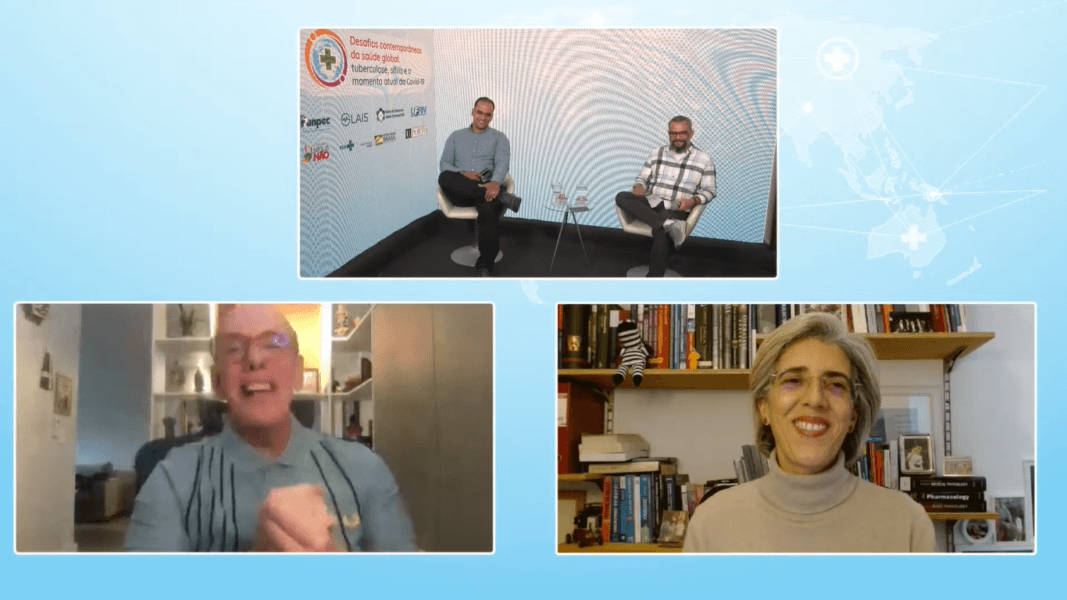Dealing with historical diseases, which have circulated among humanity for centuries, in a scenario where a new disease arises and generates concern about how health services should act. It was discussing these challenges that took place this Friday (4th) the live “Contemporary challenges of global health: tuberculosis, syphilis and the current moment of Covid-19”. The meeting was attended by Professor Raquel Duarte, from the University of Porto and former Secretary of Health of Portugal, and LAIS researchers Ricardo Valentim and Leonardo Lima. The specialists agreed that, in order to effectively confront infectious diseases, it is necessary that health organizations treat them as a global problem.
The debate was mediated by LAIS professor and researcher Carlos Alberto Oliveira. The participants of the live broadcast highlighted that both syphilis and tuberculosis are configured as a global health problem, in the same way that covid-19 is currently treated. LAIS executive director, Professor Ricardo Valentim highlighted the importance of the “Syphilis No” project, which, since its implementation, has taken this approach to tackling the disease in Brazil. “Syphilis stopped being a neglected disease when Brazil recognized the epidemic, in 2016. In 2017, with the Syphilis No project, we started a whole trajectory of confronting syphilis in Brazil,” he said.
About the covid-19 pandemic, he highlighted misinformation as a serious problem in the context of fighting the disease. “The studies mainly show an issue related to misinformation in society,” he said. The issue was also highlighted by researcher Leonardo Lima. “If there was one thing we learned with the pandemic, it was the need for information integration. This exchange of information was something that we had to improve very quickly and I believe it will be a legacy that we will take with us to face the next diseases and challenges,” said the immunologist.
For Raquel Duarte, tuberculosis is still a current public health problem. “As long as there is worldwide an infectious disease like tuberculosis, it will continue to reach people. So we have to think about diseases globally, without thinking about one country at a time. Countries that are currently trying to eliminate the disease are clinging to social and economic determinants. If we don’t work on the disease in its globality, we are heading towards the perpetuation of the disease, even with all the tools at our disposal”, he stated.
The challenges of Portugal and Brazil in the context of infectious diseases
The debate also dealt with the measures adopted to contain covid-19 in the territories. Valentim emphasized that the results obtained by Portugal in facing the pandemic, with the adoption of restrictive measures and the wide adhesion of the population to vaccination, were crucial to the current scenario in the European country, which in a certain way also reflected in Brazil. “What is happening in Portugal is very unique, but we see a reflection of what is happening there as well. The measures were taken circumstantially and we were learning how to solve these pandemic problems. Today, we are in a state of transition, perhaps, from a pandemic state to an endemic one. What we observed is that in Brazil it was very politicized. Here the vaccine, the drugs, the restrictive measures, were politicized. But science effectively had a preponderant role”, he argued.
For the former Health Secretary of Portugal, the moment demands to think about the post-pandemic future, but with an eye on global health. “We have to keep thinking about diseases in a global way, we can’t just look at one country at a time. Now is the time to move forward and look to the future.”
Leonardo Lima emphasized that although new variants of covid-19 may emerge in the coming months, we need to learn from the information we have today about the disease and fighting epidemics. “It is necessary that we look ahead. We know a lot about the virus, we have good vaccines, and it is necessary, as Dr. Raquel pointed out, to plan for the future. We need to get this data, learn from this information so that we can calmly and safely plan the resumption of economic activities, schools, so that we have a robust society to face the next challenges,” he concluded.





